Primal Scream's Return Into Their Beautiful Future
Clash Magazine
Primal Scream's Return Into Their Beautiful Future
Primal Scream's Return Into Their Beautiful Future
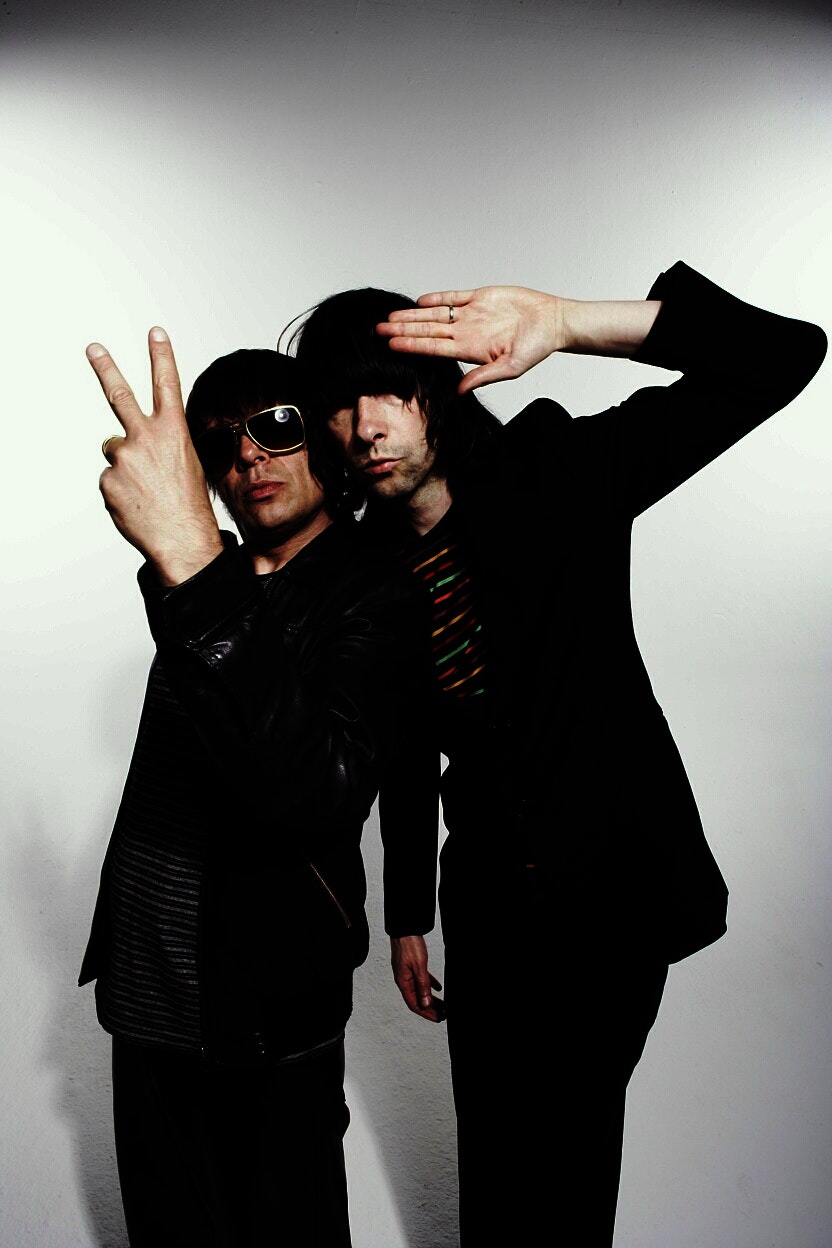
Originally published in Clash Magazine
August 2008 Cover Feature
Words by Matthew Bennett
Photos by Ellis Parrinder
In 1985, as Primal Scream first took their first toddling steps into the world of punk, the whole concept of ‘pop’ as a genre was utterly buggered for your common spotted dude.
A blotted jotter, pop was cultural shorthand for teenagers who’d not learned better and plebs that were incapable of grasping any notion of nuance or independent thought. Tarnished by the likes of Billy Idol, ABC and Matt Bianco, attempting to be more ‘pop’ stood for much that punk aimed to destroy.
Yet twenty years later Bobby Gillespie, whose band have ingested nearly every genre and spat back their own searing interpretation, have gone pop! AND recorded a Fleetwood Mac cover. Steady at the back!
As Clash catches up with the Scream’s dual protagonists one afternoon in North London, legendary bassist Mani is as laconic as he is confident when confronted with their self-confessed pop turn about on the band’s impressive ninth album, ‘Beautiful Future’.
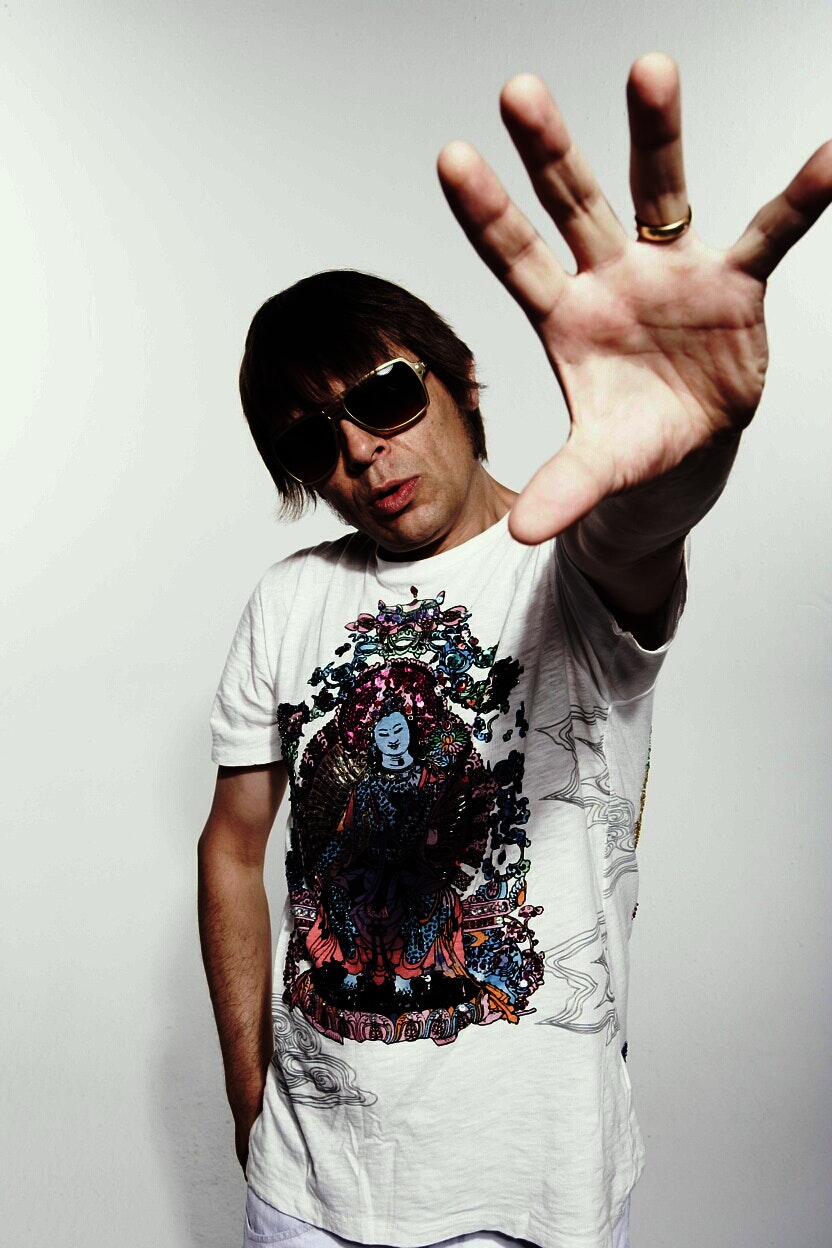
Mani: I suppose if you approach every album with the same way you approached the last one then you become involved in the repetition. It’s not as if we sit down and go ‘We’re going to make a pop album this time’. Things just evolve and happen and if something good comes out then it’s like ‘fucking hell, how did that happen? Great, let’s go with it.’
Bobby: What Mani says is right; things really just evolve. If anything this record is more melodic than the previous few. We got into the production thing in terms of we wanted it to sound big and expensive like Roxy Music records. Not copying a Roxy Music record but that really expensive production. We don’t want to be dark, garagey or grungey you know, we wanted it to be really expensive sounding like a pop sound as well; shiny and beautiful.
I think that with ‘Vanishing Point’, because we had had enough of writing ‘song’ songs - you know, verse verse, chorus chorus, middles, bridges and intros - we just felt that we had been straight jacketed; it was inhibiting creativity. So we went and did it our way and so we concentrated more on sound and atmosphere and rhythm, which is how we got [previous albums] ‘Evil Heat’, ‘XTRMNTR’, and ‘Vanishing Point’.
If your fingernails have just pierced your skins then relax. ‘Beautiful Future’ possesses much more memorable moments than their last album ‘Riot City Blues’, with the pop hooks surfing an addictive line between their signature moments that felt a bit stranded on there, and with just enough electronics to sate the eternal ‘Screamadelica’ obsessives.
Produced by Paul Epworth (Bloc Party) and Björn Yttling (Peter, Bjorn and John) alongside the usual studio dabbling from their guitarist Andrew Innes and Jagz Kooner, its accessible inflection is just the next mutation in this band’s epic life – now over twenty years into its journey – and wrought by a new generation of young producers.
Primal Scream’s output has always been defined through your eras via your producers. You like to throw new ones in don’t you?
Mani: Well you never know what people can bring to the party unless you try something new.
Bobby: You won’t make new records unless you work with new people. It’s a fact. You just make the same record over and over again.
Mani: It probably works for some people, it probably works for Radiohead to work with Nigel Godrich.
Bobby: Did he produce their last album?
Mani: Maybe so, I’m not sure. It doesn’t work for us that way; we are on an exploration thing. Trying out different things, a bit of danger. It gives some up and coming kid a chance. He’s not gonna be sat there smug and fat thinking, ‘I’ve got everything and I know everything because I made a hit record’. We want kids that are up for it, mean, lean and a bit dangerous.
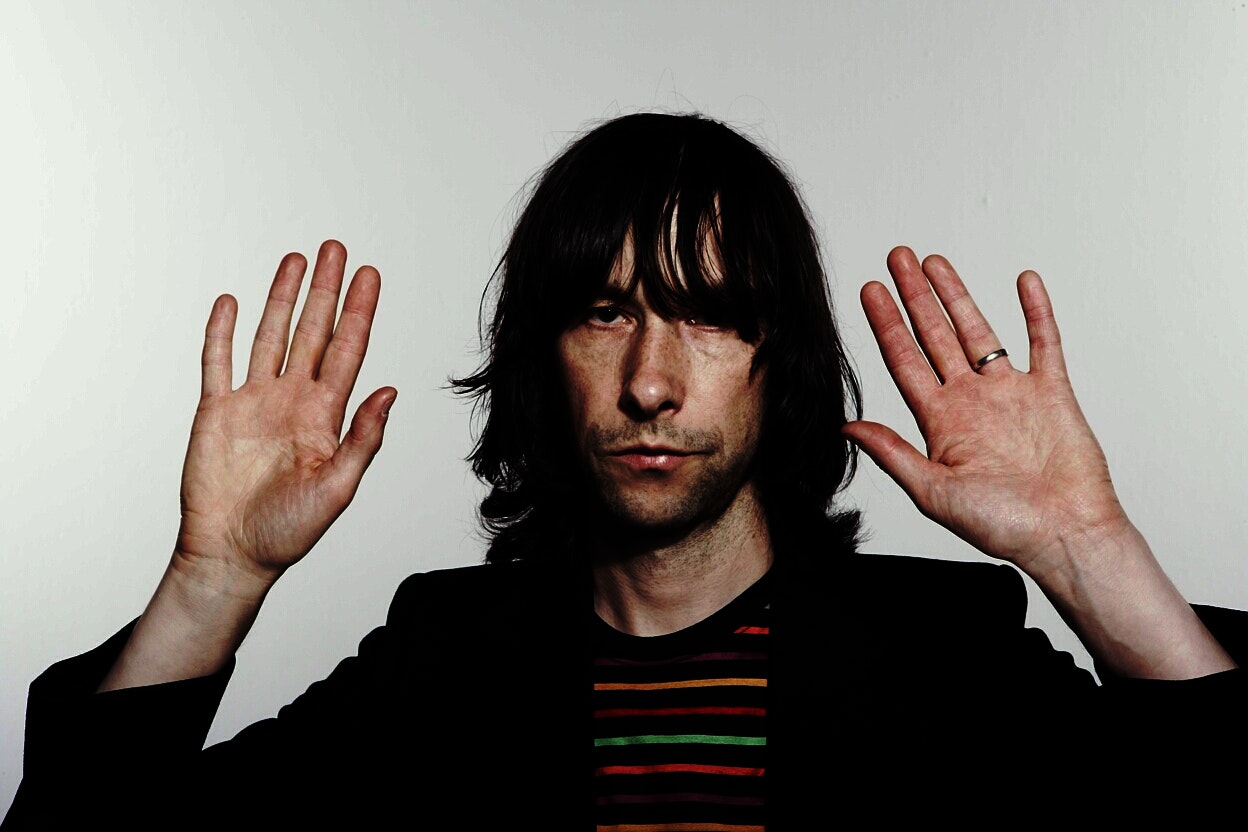
What legendary producers would you love to work with?
Bobby: Phil Spector. He is the master. I would do anything to do a session with Spector.
Mani: You’d have to take a gun in with you.
Bobby: I would be disappointed if he didn’t pull a gun on me! I’d want my fucking money back! (Chants) ‘We want our money back!’ I love that chant - it’s the best chant ever isn’t it?
So what did Bjorn as a producer bring to the table?
Bobby: Bjorn’s aesthetic is very much drums; he loves drums. He loves Bo Diddley. He was like, ‘Your band reminds me of Bo Diddley’ and I was like, ‘Whit? I don’t know what ye mean!’ and I think what he meant was just his obsession with rhythm. His whole thing was about keeping it really simple, clear and uncluttered and also very drum driven.
Mani: Bjorn knows how to use space instead of just chucking in a lick or a fill in every available gap you know? He is a very minimalist kind of guy in the way that he thinks about things. He’s tremendous with his thought and arranging things and stuff like that.
Bobby: He encouraged Primal Scream to be Primal Scream. The things that he loved in the band, he wanted to encourage rather than inhibit, which some producers can do. Some producers try to mould you into their vision of what rock music should be . . . and he’s a really funny guy as well. You have to be funny to work with us. Or we’ll destroy you.
What did Paul Epworth bring to the recording that was needed?
Bobby: Okay. Paul Epworth. He has a lot of energy, he had a lot of ideas, and he never stopped once, you know? The session just kept on always flowing and if he tried something out that didn’t work then he was right onto the next thing. He was always thinking ahead. He has got the energy of like a kid almost.
Mani: He is a great guy.
Primal Scream’s ninth album is ten sharply delivered songs that have evolved yet remain in the band’s same ‘phase’ as their last album, ‘Riot City Blues’. Good time, balls-out rock ‘n’ roll but with the Primal’s own distinct edge. At times abrupt, at others surprisingly and refreshingly conventional.
‘Evil Heat’ and ‘XTRMNTR’ albums cast a cynical shadow with Bobby’s lyrics firing both barrels at themes such as state sponsored violence, repression and conspiracy. Desolate electronic production from Two Lone Swordsmen (Weatherall and Tenniswood) formed the perfect canvas for the band to daub their urban cries and searing musical statements in stadia sized forms.
Yet take a quick scan of the track listing of ‘Beautiful Future’ and you’d think the lads had just come back from a month on the beach. Track titles such as ‘Beautiful Summer’, ‘Uptown’, ‘Can’t Go Back’, ‘Viva!’ and ‘The Glory Of Love’ all conjure a vastly more optimistic atmosphere a far cry from the seething vitriol and paranoia of just two albums ago.
However Bobby doesn’t put short shrift into the notion that his band have gone soft…
Bobby: They are ecstatic and euphoric but there’s NOT a real optimistic vibe. Our world view hasn’t changed. We are affected by the culture, affected by everything that happens. It’s in the album, it’s in our music and it’s in our songs.
Mani: Once again, I am going to use this one: the Primal Scream Trojan Horse comes rolling out. People think you get one thing and it sounds a certain way, but if they dig a little deeper people will find out there’s something else going on underneath it.
Bobby: It’s not like everything is bright and rosy and beautiful. It’s not love, peace, and flowers kind of hippy thing. We had a great hit record last year and we feel great, it’s a punk record. It’s a view of things. It’s very strongly put across in this record.
Mani: We don’t do smug and contented.
Bobby: We don’t like the way things are, and you know what? We are writing about it and singing about it you know? It’s bubblegum with razor blades in it. That’s my little phrase.
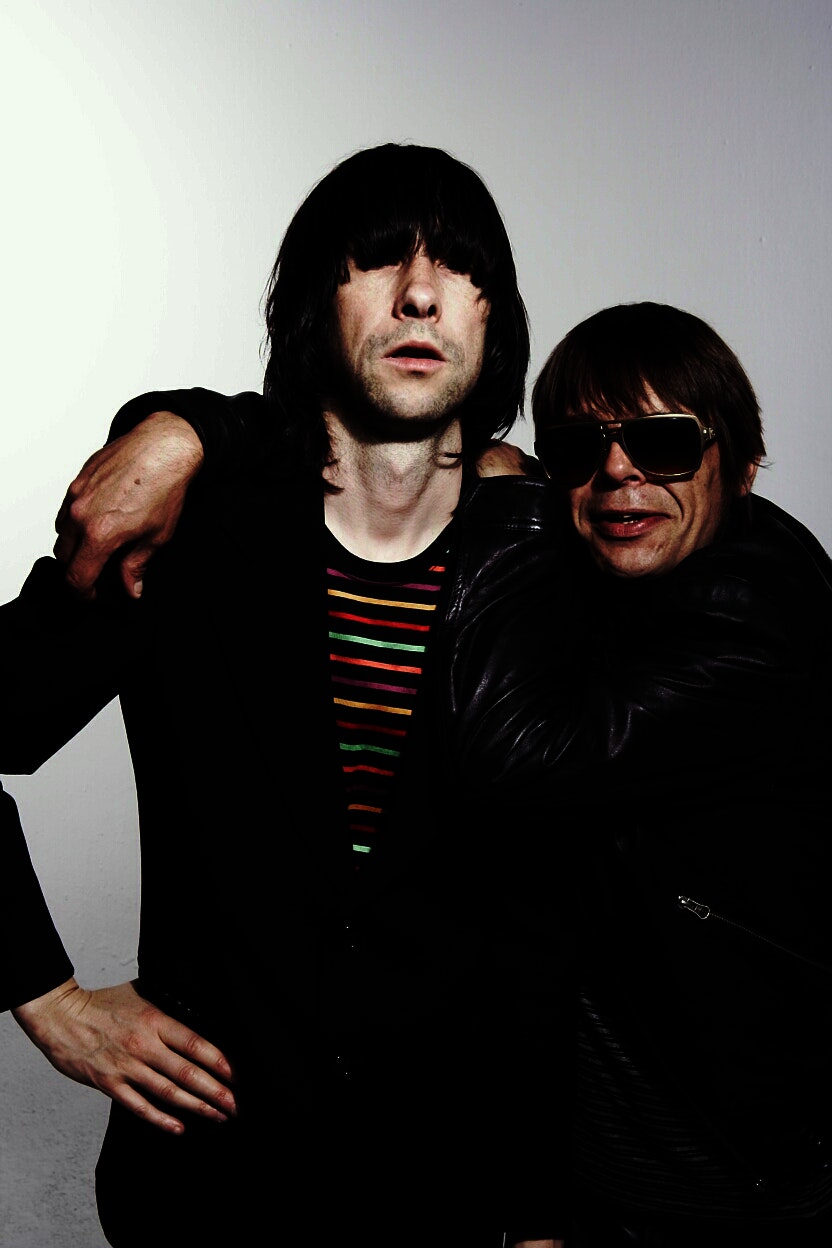
Your new single ‘Can’t Go Back’ proclaims: “stick a needle in my arm, stick it in my baby’s heart” So is this the band pledging to never doing heroin again?
Bobby: No, no, no. Not at all. It’s always going to be there isn’t it? It is more about making fun of paranoia, psychoses and hallucinations that become real. It is not an anti drug song if that’s what you mean. No, I could never write one of those. “Never say never to always”, as Charles Manson said.
‘Beautiful Future’ has some points where it will flank even die hard fans. A Fleetwood Mac song, ‘Over And Over’, and collaborations with Josh Homme from Queens Of The Stone Age, folk legend Linda Thompson and most notably Lovefoxx from CSS, all combine for a unique blend.
This latter sees the Brazilian icon duet on ‘Love To Hurt You’ and sees the older band reach out and put their faith in the younger generation once again on this album.
Bobby reveals how it came about: “Well years ago we met CSS but we never knew they were CSS, at a big festival in Brazil and they were really great fun. Sao Paolo was brilliant. And next thing, you know, they are famous in Britain. I think I went to see them play, I bought their record and I seen them in the press and I loved them. I thought it was Blondie or something. We went to see them play, went backstage, they were really nice to us, had a few drinks and I said to Lovefoxx, “Do you want to sing in one of our records?” That simple. But I don’t think she thought I was being serious, just kinda humouring a drunk guy, you know? ”
I heard they have turned into quite a party band, so what advice would you give them?
Mani: Keep partying! Just enjoy it man.
Bobby: They seem to know what they are doing I think. They are intelligent young people you know. I don’t think that they are going to be a bunch of smack heads soon. I don’t think there is any darkness in that band.
So where is the worse place you have ever woken up?
Mani: We’ve woken up in some bad fucking states and with people you shouldn’t have been with. That’s what happened when you take fucking drugs and you get pissed up. You’re a fool to yourself. Mind you its all part of life’s rich tapestry.
Bobby: It is self-induced psychosis; anywhere where I have woken up in a state of psychosis is not good. Even now you can find something to learn about yourself so it’s not bad. Nothing is that bad.
What is the most shameful thing that has ever happened to you in the last year?
Bobby: Shameful? These are negative questions man.
Mani: I got arrested just before we played the Leeds Festival after being on the piss for two days. I put the gig and the band in jeopardy, which is pretty shameful. It was disgusting of me but then again I’m over it. They let me back out just in time for the gig, nice little lie down in the afternoon and an eighty pound fine. Thanks lads.
When was the last time you pinched yourself in disbelief?
Mani: Mostly on a daily basis. ‘How the fuck am I still here man? Why am I still here?’ For a reason: to be with these guys. Daily.
What have you still got to prove?
Mani: Fuck all. That we can still cut it at the highest level I suppose and that we are still relevant. Only to ourselves really.
Bobby: It’s like Ian Curtis. The best thing I ever read, I don’t think you can say he did many interviews right, but I remember this before I was ever in a band and I remember this thing that Ian Curtis said… They were asking him about what Joy Division songs meant and obviously they are pretty heavy songs and really personal and the journalist asks, “Do you worry about the future?” and he says about his band “You’re always looking towards the next song.” That’s good, I like that. He’s right, before you can even finish an album we’re thinking about the next cos you still have that energy and the joy of creating something.
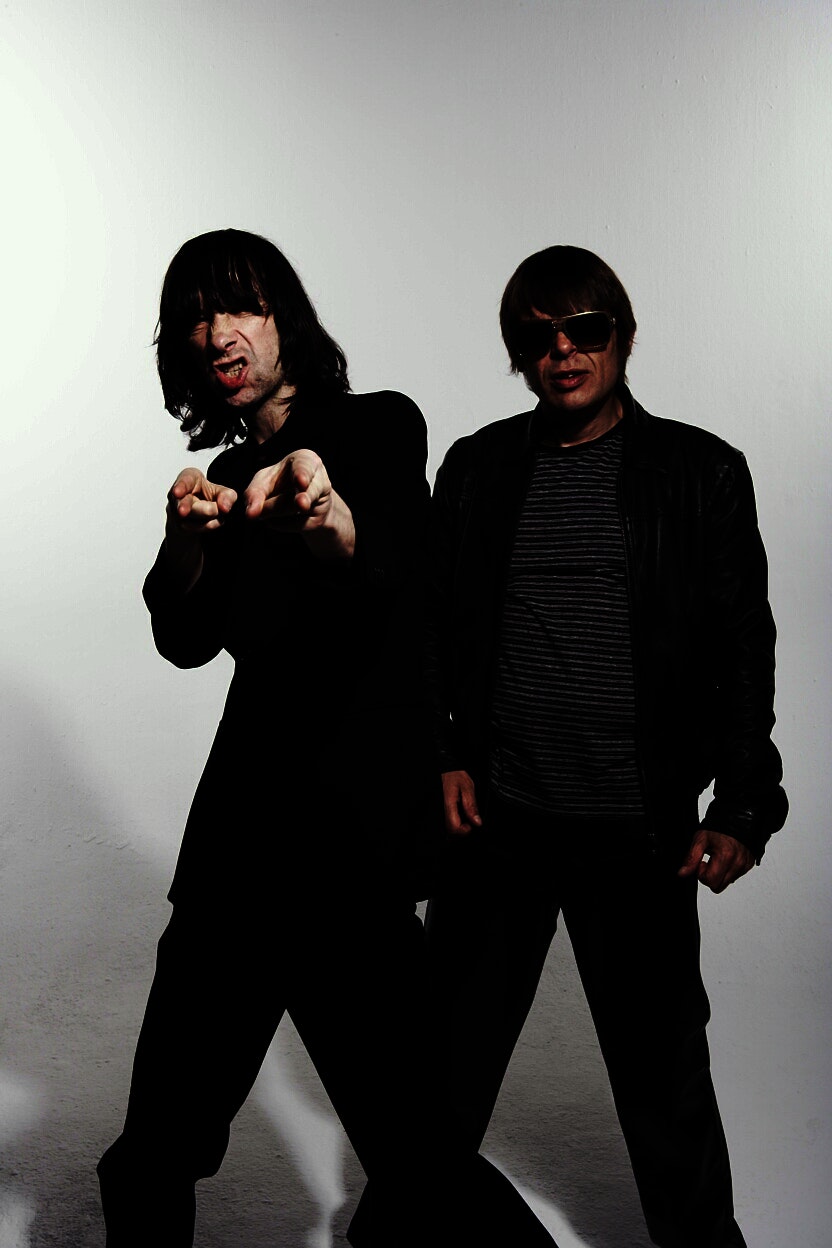
Why should a sixteen-year-old who is not familiar with Primal Scream go out and buy the new album?
Mani: Consider it to be an educational tour. You could learn from it, philosophically and musically.
Bobby: It’s a great sequence of songs, it’s great ideas; there are a lot of great ideas. It’s a great musical experience, that’s why. And it might make them feel good.
Mani: It’s true and it’s not from some fucking manipulated TV show genre.
Bobby: It’s soulful music.
Mani: It’s from the heart and from the groin. Good music should always come from the groin. Never the brain. Good music is about fucking. Good music is about good sex isn’t it?
Do you think it is too easy to be in a band and find success these days?
Mani: There seems to be a lot more support and a more direct route. A lot more direct, mainly with these scumbag shite TV shows. But the thing is it is all disposable and throwaway these days. People get there very quickly and are forgotten about just as quickly. There is no substance about it. I still believe in the old traditional way of going playing toilets for fucking six years and earn it. Off the back of playing music than playing any other game.
Bobby: I think it has always been the same, because of the age we are at we have always been, even before we were in bands, if we looked at the charts right from ’72, ’73 all the way through the Seventies and the Eighties, and spot picked a couple of weeks in those years we would say, ‘Oh yeah, do you remember them?’, you know, one hit wonders, a band that was around for six months that have got really, really fucking big and then they have disappeared. There are hundreds of bands like that. I think even in retrospect they may have been manufactured.
Mani: They are not going to be big, but they still might not be doing gigs in ten years let alone twenty. And maybe not a lot or records with a lot of substance like we have talked about…like a ‘Stone Roses’ or a ‘Screamdelica’ – not in their bones for twenty years - it’s all too immediate and all too disposable. It is strange you know?
It is all about the internet. You can come from out of nowhere and go back to nowhere.
Bobby: I dunno what’s inside the heads of twenty-year-olds that are in bands now. I’m sure people still go into the studio they way we did and the way we still do, and you think, ‘I’ve got this great song and I am going to make the greatest record ever made. I’m going to make a fucking classic national anthem!’ Surely there has got to be people still doing that, even if you don’t hear about it.
Mani: But then again there are a lot of people out there who just plod along, play the game and make music to get paid for, not to change anything, anything controversial. It might make you some money. I see Alex Turner still being talked about in twenty fucking years’ time out of the new crop. I think he is fucking brilliant man.
There are two distinct paths out there now, I’d prefer to taking the road traditionally, fucking offending people and doing it edgy and a bit dangerous you know?
Bobby: The only thing that I would say right is that if you look at music as a cultural thing. When we were doing ‘XTRMNTR’ and ‘Evil Heat’, which was the start of this decade, 2001, The Strokes and The White Stripes came through, both good bands, both bands I respect and I admire. But it seems to me that after those two bands came through they inspired millions of kids to pick up guitars and buy leather jackets and wear ripped jeans and be in a band - which is fantastic. But the music that has came out since then which is, you know, alternative, independent, young people’s rock music, none of it seems to try to experiment or go onto areas where they have never went before. It just seems to be the blueprint is garage rock and that is as far as people’s music ambitions go and it’s not further than that. No one is doing anything new or trying to pretend to do anything new; it’s like a full stop, a dead end.
Do you feel responsible for that a little bit?
Bobby: No, because we made ‘XTRMNTR’ and ‘Evil Heat’, two pretty fucked up records and they are pretty experimental
No, I mean do you feel responsible in that respect because you have taken it that far and it’s hard for people to elevate over the top?
Bobby: No, not at all. But fuck’s sake, why have people not got any imagination? Nobody is trying to do anything different or even look different. It just seemed to be a fast track. I don’t want to slag The Kooks off, but you know…
Mani: People are getting force-fed bollocks and swallowing it. I’m not having it man. I’m not having it at all.
Bobby: You just want people to be a bit more adventurous but in saying that I don’t want to stop anybody from having a good time in their twenties; fuck it, they are having a great time. Do you know what? Great. I am happy for them but it seems to me that there is nobody that wants to push it a bit further or even make it a bit darker. It’s all a bit too Freddie And The Dreamers to me.
Mani: It is all a bit inoffensive, ergo forgettable.
Bobby: What does ‘ergo’ mean?
Mani: Therefore.
So with all the technology available now, would you rather have come through in the late Eighties with the privilege of having new drugs and acid house or now with the Internet and more scope in sound? What would it be?
Mani: Acid house is in part what has made us what we fucking are! That’s one of the building blocks of life for us, punk rock then acid house. Absolutely some of the best fucking times ever man. Unreal! We came from that era as a reaction to what we had to grow up with. If you had to grow up with all that bland shite… It mirrors what you have lived through. We had to deal with growing up with Thatcher. We had to grow up in the mid Eighties and write about it and live it - with Thatcher going to war on your people. No wonder people are making bland fucking music now, cos they have to live bland fucking lives.
Bobby: But in saying that some people have came out of that making good rock and roll music…that kinda thing, Jesus And Mary Chain, Nick Cave And The Bad Seeds, The Smiths… I guess then as well that what they were doing was so brave and out there, they were so different to everything else that was going on you know.
You are very privileged to have that intersection of bland rock and drugs to react against.
Mani: In a way it saved music and got people thinking in a way that they could go and create music with knowledge, with a guitar and the old school and melding with the new thing with the beats to make something completely fucking wonderful.
Bobby: But the thing is right, when we were young punks we never took drugs as a reaction against hippies. The guy across the road from me used to smoke dope and I would think, ‘You disgusting cunt! You fucking coward running away from reality!’ I was like, ‘Face up to reality! We live in a fucking shithole - get used to it or do something about it.’ That was my attitude. I think it was a reaction to what had gone before and also a reaction to the west of Scotland drinking-yourself-to-death culture. I remember thinking ‘I’m not having that’.
Mani: That’s probably what they wanted you to think. The late Eighties thing, taking drugs was a mind expanding thing. With the Tories, when they didn’t want people coming together with the working class, the acid house movement brought people all together, having raves… they didn’t like it at all, they tried to stop it. With people coming together they could only spell one thing…TROUBLE.
Bobby: I think newspapers, TV and news is manipulated to create a climate of fear to control the population. Distrust. Also, distrusting foreigners and outsiders; easily manipulated you know? And the newspapers, there’s never any good news on the radio or TV or newspapers, it’s streamlined so that it is always bad, and it’s bad energy, bad news. They create a climate of fear. I think that half the time Margaret Thatcher was in the politics of division; she wanted to divide people and she did divide people very successfully.
That’s one thing that I think the trade union movement was good for - working class people felt good about themselves cos they had a place in the community or society where they were good at their job. It is a good strong sense of self. It is formidable and it is unbeatable. The thing she really went for was dividing people and stuff; making council houses, selling them off so that people suddenly were like, ‘He’s got a different coloured door from me, what does that mean?’ When people bought a council house the first thing they done was paint the door a different colour to say, ‘This is mine!’ [Beats chest] I think that acid house in that climate was political, it brings people together and, you know, a lot of people found themselves in acid house, just like punk.
But I think acid house wasn’t consciously political but it was political in the sense that it did bring people together. Even though they might have been together because they were taking ecstasy and dancing to electronic disco music from Chicago and Detroit. The thing was that they were together and they were forging new relationships, maybe learning something about themselves; that they could be a creative person. They could be a photographer, musician, DJ, TV presenter, make a fanzine, run a club or run the door on a club or do the back drops or projections.
Primal Scream epitomised this watershed and community explosion. Never before has a band been so transformed by musical culture. At the close of the interview as Bobby speaks, he drags his experience to the fore to address the youth and younger bands who he feels are still playing catch up, rounding off with a rallying call to visionary arms…
Bobby: Anything that encourages people to be creative and interact with other people is a great thing. When you are creative and you interact with other people you feel a sense of usefulness and you are not on your own and you don’t feel useless. If you’re unemployed, skint and on your own you’re going to feel like a piece of shit, right, but anything that makes you feel useful, the camaraderie that you get, self-respect and stuff that you get, then you’re invincible, nobody can beat you!
‘Beautiful Future’ is out now on Atlantic Records.